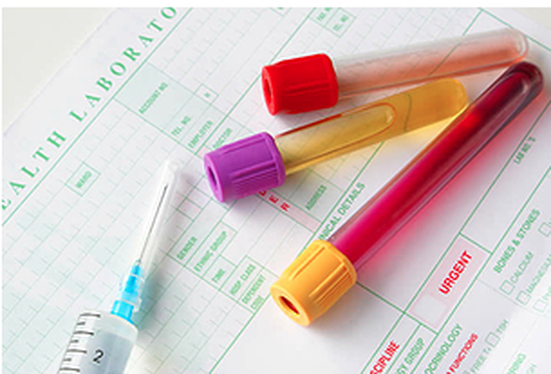Authored by: Dr. Barrett
You just had some labs done for your corporate wellness program and the results came back normal. This means you are healthy and don’t need any additional tests, right? Wrong. Corporate wellness screenings offer very minimal insight in to your overall health. Many screenings only look at cholesterol, blood sugar, blood pressure, and BMI. The benefit of a screening is to identify potential issues before they become an actual problem. Many corporate screenings will only identify things that have already become a problem. I often see patients who think that their corporate screening every year is the only blood work they need as long as it all comes back normal. This is simply not the case, especially when you take family history and lifestyle in to account. If you know you have a family history of heart disease, for example, it might be wise to screen with cardiovascular labs each year. Below are some additional screening tests to consider discussing with your doctor.
Diabetes/Pre-Diabetes/Insulin Resistance:
A single glucose reading is a not a good measure of blood sugar imbalance. A glucose level is just a snapshot of what your sugar level was in the instant your blood was drawn. If this number is out of range, you already have a problem. I want to know what a patient’s fasting insulin level is compared to their fasting glucose. This is how I identify a blood sugar problem (insulin resistance) before it becomes diabetes. Your glucose can be 98 (within the normal range) and your insulin can be 17 (within the normal range) but when you compare the two using the HOMA-IR calculator you find that person has significant insulin resistance and is on their way to diabetes. A healthy body requires very little insulin to keep blood sugar levels in check. Another usual blood sugar screening tool is HbA1c. This is a measure of how much sugar is stuck to your red blood cells. Since red blood cells live for about 3 months it gives us a good measure of what your average blood sugar has been over the past three months. Your glucose level on your screening test may have been 70 (great!) but your HbA1c could paint a very different picture.
Tests to discuss with your doctor: Fasting Glucose, Fasting Insulin and HbA1c
Cardiovascular Health
You have probably heard something about inflammation and overall health in the news recently. A cover of TIME magazine called inflammation the secret killer. The truth is inflammatory markers are a much better predictor of a cardiovascular event than cholesterol. Yet, we still use cholesterol as a screening test for cardiovascular health. It is still important to keep your cholesterol numbers in a healthy range but at least equally as important is knowing your inflammation levels. High sensitivity c-reactive protein (hsCRP) is a measure of how much inflammation is happening in your cardiac tissue. When this test comes back elevated it is important to work on reducing inflammation. You can have very low cholesterol levels but high inflammation which is still a problem for cardiovascular health.
Tests to discuss with your doctor: hs-CRP
Vitamin D:
Vitamin D is naturally produced in our bodies when our skin is exposed to sunlight. In Minnesota we can only make vitamin D from March-October meaning we have to supplement or we can become deficient. Vitamin D acts as a hormone in our bodies and not having enough will increase your risk for autoimmune conditions, diabetes, depression, osteoporosis, cardiovascular disease, cancer and more. Optimal ranges for vitamin D are between 60-80ng/dl. If your test comes back out of range talk with your doctor about proper vitamin D3 dosing.
Tests to discuss with your doctor: Vitamin D
Liver:
Our liver does a lot of work for our bodies. It processes all the chemicals we are exposed to on a daily basis; any medications we take, all of our hormones, stores our fat soluble vitamins, handles cholesterol storage and transport, the list goes on. Checking in to make sure your liver isn’t under stress is also very important. I recommend patients have a yearly metabolic panel done that will look at not only your liver function but also your kidney function. This test is relatively inexpensive. A condition that is increasing in our population is non-alcoholic steatohepatitis/fatty liver disease (NASH/NAFLD). A condition in which your liver becomes inflamed and fibrotic even when you are not abusing alcohol. This condition often goes hand in hand with insulin resistance. As our sugar levels and insulin levels rise the liver has to work very hard and can become damaged. I use ferritin, a measure of iron, to screen for this condition as ferritin is an independent predictor of NASH. I have screened for this condition and found it in several patients who were completely unaware that they had a liver condition. You only become symptomatic in late stages when there is little that can be done to reverse the condition. When caught early this condition is treatable with diet and lifestyle changes.
Tests to discuss with your doctor: Comprehensive Metabolic Panel (CMP), Ferritin
You just had some labs done for your corporate wellness program and the results came back normal. This means you are healthy and don’t need any additional tests, right? Wrong. Corporate wellness screenings offer very minimal insight in to your overall health. Many screenings only look at cholesterol, blood sugar, blood pressure, and BMI. The benefit of a screening is to identify potential issues before they become an actual problem. Many corporate screenings will only identify things that have already become a problem. I often see patients who think that their corporate screening every year is the only blood work they need as long as it all comes back normal. This is simply not the case, especially when you take family history and lifestyle in to account. If you know you have a family history of heart disease, for example, it might be wise to screen with cardiovascular labs each year. Below are some additional screening tests to consider discussing with your doctor.
Diabetes/Pre-Diabetes/Insulin Resistance:
A single glucose reading is a not a good measure of blood sugar imbalance. A glucose level is just a snapshot of what your sugar level was in the instant your blood was drawn. If this number is out of range, you already have a problem. I want to know what a patient’s fasting insulin level is compared to their fasting glucose. This is how I identify a blood sugar problem (insulin resistance) before it becomes diabetes. Your glucose can be 98 (within the normal range) and your insulin can be 17 (within the normal range) but when you compare the two using the HOMA-IR calculator you find that person has significant insulin resistance and is on their way to diabetes. A healthy body requires very little insulin to keep blood sugar levels in check. Another usual blood sugar screening tool is HbA1c. This is a measure of how much sugar is stuck to your red blood cells. Since red blood cells live for about 3 months it gives us a good measure of what your average blood sugar has been over the past three months. Your glucose level on your screening test may have been 70 (great!) but your HbA1c could paint a very different picture.
Tests to discuss with your doctor: Fasting Glucose, Fasting Insulin and HbA1c
Cardiovascular Health
You have probably heard something about inflammation and overall health in the news recently. A cover of TIME magazine called inflammation the secret killer. The truth is inflammatory markers are a much better predictor of a cardiovascular event than cholesterol. Yet, we still use cholesterol as a screening test for cardiovascular health. It is still important to keep your cholesterol numbers in a healthy range but at least equally as important is knowing your inflammation levels. High sensitivity c-reactive protein (hsCRP) is a measure of how much inflammation is happening in your cardiac tissue. When this test comes back elevated it is important to work on reducing inflammation. You can have very low cholesterol levels but high inflammation which is still a problem for cardiovascular health.
Tests to discuss with your doctor: hs-CRP
Vitamin D:
Vitamin D is naturally produced in our bodies when our skin is exposed to sunlight. In Minnesota we can only make vitamin D from March-October meaning we have to supplement or we can become deficient. Vitamin D acts as a hormone in our bodies and not having enough will increase your risk for autoimmune conditions, diabetes, depression, osteoporosis, cardiovascular disease, cancer and more. Optimal ranges for vitamin D are between 60-80ng/dl. If your test comes back out of range talk with your doctor about proper vitamin D3 dosing.
Tests to discuss with your doctor: Vitamin D
Liver:
Our liver does a lot of work for our bodies. It processes all the chemicals we are exposed to on a daily basis; any medications we take, all of our hormones, stores our fat soluble vitamins, handles cholesterol storage and transport, the list goes on. Checking in to make sure your liver isn’t under stress is also very important. I recommend patients have a yearly metabolic panel done that will look at not only your liver function but also your kidney function. This test is relatively inexpensive. A condition that is increasing in our population is non-alcoholic steatohepatitis/fatty liver disease (NASH/NAFLD). A condition in which your liver becomes inflamed and fibrotic even when you are not abusing alcohol. This condition often goes hand in hand with insulin resistance. As our sugar levels and insulin levels rise the liver has to work very hard and can become damaged. I use ferritin, a measure of iron, to screen for this condition as ferritin is an independent predictor of NASH. I have screened for this condition and found it in several patients who were completely unaware that they had a liver condition. You only become symptomatic in late stages when there is little that can be done to reverse the condition. When caught early this condition is treatable with diet and lifestyle changes.
Tests to discuss with your doctor: Comprehensive Metabolic Panel (CMP), Ferritin

Dr. Sara Jean Barrett is a licensed Naturopathic Doctor and co-founder of Wellness Minneapolis. She is also the Vice President of the Minnesota Association of Naturopathic Physicians and a Member of the American Association of Naturopathic Physicians. Click here to learn more about Dr. Barrett.


 RSS Feed
RSS Feed